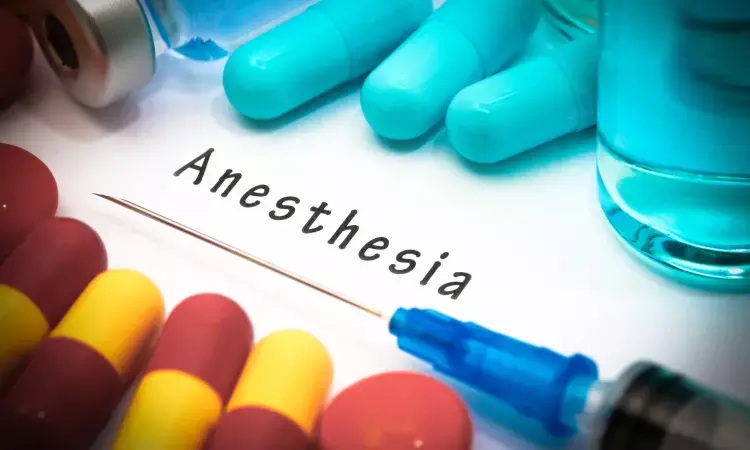- Home
- Medical news & Guidelines
- Anesthesiology
- Cardiology and CTVS
- Critical Care
- Dentistry
- Dermatology
- Diabetes and Endocrinology
- ENT
- Gastroenterology
- Medicine
- Nephrology
- Neurology
- Obstretics-Gynaecology
- Oncology
- Ophthalmology
- Orthopaedics
- Pediatrics-Neonatology
- Psychiatry
- Pulmonology
- Radiology
- Surgery
- Urology
- Laboratory Medicine
- Diet
- Nursing
- Paramedical
- Physiotherapy
- Health news
- Fact Check
- Bone Health Fact Check
- Brain Health Fact Check
- Cancer Related Fact Check
- Child Care Fact Check
- Dental and oral health fact check
- Diabetes and metabolic health fact check
- Diet and Nutrition Fact Check
- Eye and ENT Care Fact Check
- Fitness fact check
- Gut health fact check
- Heart health fact check
- Kidney health fact check
- Medical education fact check
- Men's health fact check
- Respiratory fact check
- Skin and hair care fact check
- Vaccine and Immunization fact check
- Women's health fact check
- AYUSH
- State News
- Andaman and Nicobar Islands
- Andhra Pradesh
- Arunachal Pradesh
- Assam
- Bihar
- Chandigarh
- Chattisgarh
- Dadra and Nagar Haveli
- Daman and Diu
- Delhi
- Goa
- Gujarat
- Haryana
- Himachal Pradesh
- Jammu & Kashmir
- Jharkhand
- Karnataka
- Kerala
- Ladakh
- Lakshadweep
- Madhya Pradesh
- Maharashtra
- Manipur
- Meghalaya
- Mizoram
- Nagaland
- Odisha
- Puducherry
- Punjab
- Rajasthan
- Sikkim
- Tamil Nadu
- Telangana
- Tripura
- Uttar Pradesh
- Uttrakhand
- West Bengal
- Medical Education
- Industry
Safety of ketamine in children with ADNP syndrome: A role beyond anesthesia

USA: A study evaluated the efficacy of low-dose ketamine to be safe and well-tolerable in children with Activity-Dependent Neuroprotective Protein (ADNP) syndrome. The study was published in Human Genetics and Genomics Advances journal.
ADNP syndrome is a rare neurodevelopmental genetic disorder caused by a mutation in the ADNP gene. The hallmark features of the syndrome include intellectual disability, developmental delays, motor planning delays, and autism spectrum disorder (ASD) or autistic features. Due to the rarity of the disease, trials are scarce, and no standardized treatment protocol exists.
Ketamine is an N-methyl-D-aspartate receptor antagonist widely used in anesthesia. Ketamine in the pediatric population is neuroprotective and neurotoxic based on the dosage. The low dose is efficacious in managing treatment-resistant depression in adults, indicating its therapeutic potential beyond the mentioned scope.
Wink et al. and team determined the safety of two fixed doses of ketamine through intranasal administration in ASD, but no significant improvement in social withdrawal was recorded. The rarity of the disease requires trials for targeted treatment to record enhanced response.
Based on the potential of low-dose ketamine in inducing ADNP overexpression from previous research, Kolevzon et al and a team from Seaver Autism Center for Research and Treatment and the Department of Psychiatry at Icahn School of Medicine at Mount Sinai, New York, analyzed the efficacy of low dose ketamine in ANDP syndrome.
The study involved a single dose (0.5 mg/kg) of racemic ketamine hydrochloride infused intravenously over 40 minutes with an infusion pump. Ten children aged 6 to 12 years were enrolled in the study. The study utilized electrophysiological measurement of auditory steady-state response and eye-tracking to index the changes with ketamine treatment.
Clinical outcomes assessment included parent-rated questionnaires, clinician-related measures, and objective measures. The clinical visits were assessed at baseline and weeks 1,2, and 4.
The key summary of the study includes:
• Findings from the study support the use of ketamine in ADNP syndrome.
• There was consistency in results obtained from clinician-rated and caregiver-rated assessments.
• The study recorded a global improvement in specific domains of social behavior, attention deficit, hyperactivity restricted and repetitive behaviors, and sensory reactivity.
• The treatment effect persisted beyond week 1, with significant improvement in weeks two and 4 in most domains.
• No significant improvement in sleep was measured.
• One patient experienced vomiting during infusion.
• The adverse event (AE) recorded were elation/silliness (50 %), drowsiness and fatigue (40 %), aggression (40 %), decreased appetite (30 %) and restlessness (20 %).
• There were no serious AEs, and no abnormalities in cardiac monitoring were detected.
The researchers said, " The results of this small and unique study are hypothesis-generating and suggest safety and well-tolerability of ketamine in children with ADNP syndrome." The study highlighted the role of ketamine in improving social communication and sensory reactivity symptoms.
Ketamine is approved by Food and Drug Administration (FDA) for anesthetic use in children. The FDA approved this study's Investigational New Drug application (IND 147201).
References:
An Open-Label Study Evaluating the Safety, Behavioral, and Electrophysiological Outcomes of Low-Dose Ketamine in Children with ADNP Syndrome – ScienceDirect.
https://rarediseases.org/rare-diseases/adnp-syndrome/
BDS, MDS in Periodontics and Implantology
Dr. Aditi Yadav is a BDS, MDS in Periodontics and Implantology. She has a clinical experience of 5 years as a laser dental surgeon. She also has a Diploma in clinical research and pharmacovigilance and is a Certified data scientist. She is currently working as a content developer in e-health services. Dr. Yadav has a keen interest in Medical Journalism and is actively involved in Medical Research writing.
Dr Kamal Kant Kohli-MBBS, DTCD- a chest specialist with more than 30 years of practice and a flair for writing clinical articles, Dr Kamal Kant Kohli joined Medical Dialogues as a Chief Editor of Medical News. Besides writing articles, as an editor, he proofreads and verifies all the medical content published on Medical Dialogues including those coming from journals, studies,medical conferences,guidelines etc. Email: drkohli@medicaldialogues.in. Contact no. 011-43720751


